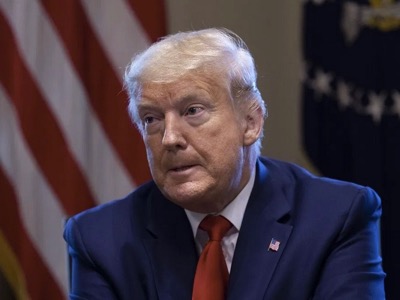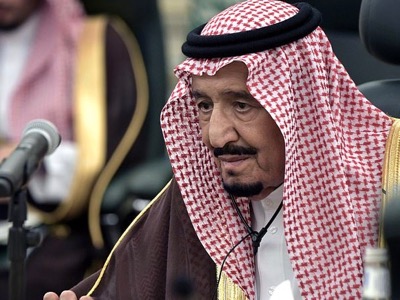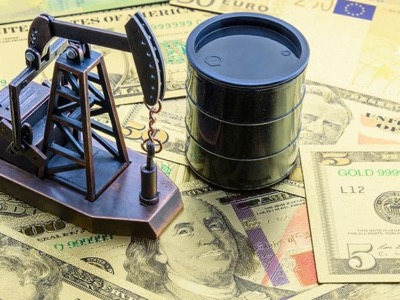Trump adapts US energy strategy

While most people are absorbed by the time-distribution measures of the epidemic, the Saudis are questioning the power of their American protector. A showdown between Riyadh and Washington, which was already disrupting the world economy before the spread of Covid-19. President Trump considered taking control of Saudi and Venezuelan oil, which apparently led him to forge new alliances.
For the past three years, President Trump and his CIA director and then Secretary of State Mike Pompeo have been trying to abandon their country’s imperialism and replace it with an economic strategy. This supposes that Washington can still be the world leader provided it has a powerful army and energy autonomy.
Donald Trump has authorized the exploitation of protected areas, has relaunched the construction of pipelines and has continued the shale adventure even though it is by nature ephemeral. The political evolution of Saudi Arabia with the megalomania of Crown Prince Mohamed ben Salmane was first managed by extorting as much money as possible from him at each of his follies, then turned to clash. Finally, MBS opened an oil war, not against Russia, but against the US shale industry. It deliberately caused the price to plummet from $70 a barrel to under $30. However, this showdown unexpectedly coincided with the Covid-19 epidemic and the dizzying drop in global energy consumption. The epidemic is also affecting the United States, where some of the senior officers intend to proclaim improved martial law and put an end to the Trump experiment.
These three realities (President Trump’s economic strategy, the Saudi rebellion and the coronavirus epidemic) are colliding. To analyse them, we will arbitrarily dissociate them while keeping in mind that each logic can suddenly be disrupted by the other two.

- The Portuguese spy ship RCGS Resolute. It sank a Venezuelan Coast Guard ship with its icebreaking bow, unusual, to say the least, in the Caribbean Sea.
Economic Strategy
Faced with the collapse of oil prices, President Trump considered that he had no other solution than to take over the world’s main reserves, those of Venezuela. For several years, the CIA and SouthCom have been destabilizing this country in preparation for the Rumsfeld/Cebrowski plan to destroy the state structures of the Caribbean Basin. The country has reached a point where a possible elimination of President Nicolás Maduro would provoke no more reaction than that of Panamanian Army Chief Manuel Noriega in 1989.
The United States has therefore convinced the European Union to join a “just cause” operation: the kidnapping of President Maduro and the country’s strongman, Diosdado Cabello. The United Kingdom, France, Spain, Portugal and the Netherlands – the former colonial powers of South America – volunteered.
![]() On March 26, the US Department of Justice issued a wanted and reward notice for President Maduro and his team, whom it accused of drug trafficking.
On March 26, the US Department of Justice issued a wanted and reward notice for President Maduro and his team, whom it accused of drug trafficking.
![]() On March 31, the State Department issued a framework for a democratic transition in Venezuela that excludes both former President Maduro and self-proclaimed President Guiado [1].
On March 31, the State Department issued a framework for a democratic transition in Venezuela that excludes both former President Maduro and self-proclaimed President Guiado [1].
![]() At the beginning of April a Portuguese spy vessel, the RCGS Resolute, managed to sink the Venezuelan coastguard ship that had come to board it, escape and place itself under Dutch protection on Curacao. France and the United Kingdom dispatched two warships, the amphibious helicopter carrier Dixmunde and the container ship FRG Argus, to the area to bring arms and ammunition under cover of anti-Covid transport. [2] A US destroyer and several Navy ships were placed under the command of the Drug Enforcement Agency.
At the beginning of April a Portuguese spy vessel, the RCGS Resolute, managed to sink the Venezuelan coastguard ship that had come to board it, escape and place itself under Dutch protection on Curacao. France and the United Kingdom dispatched two warships, the amphibious helicopter carrier Dixmunde and the container ship FRG Argus, to the area to bring arms and ammunition under cover of anti-Covid transport. [2] A US destroyer and several Navy ships were placed under the command of the Drug Enforcement Agency.
However, this operation was interrupted by the US Navy due to the epidemic.

- King Salmane, who was already suffering from Alzeimher’s disease, was placed in confinement in a palace near Jeddah. His eventual death would open the door to a terrible war of succession.
The Saudi Rebellion
The Saud family remains rooted in the culture of the desert. Its mode of operation is at odds with the modern world, as shown by the beheading of the leader of the political opposition Sheikh Nimr Baqr al-Nimr (2016), the arrest of almost all the princes of the royal family and the confiscation of their wealth (2017), and the sawing up of one of its nationals in a foreign consulate (2018).
According to this culture, it does not matter whether one commits suicide if it is to exact revenge. After being manipulated and despised by Jared Kushner and Donald Trump, the Crown Prince decided to take revenge by destroying the US shale oil industry, which cannot survive oil prices below $35 a barrel.
Seeing the impossibility of bringing Saudi Arabia to its senses, President Trump chose not to sabotage its oil wells, but to inflict a resounding defeat on the Crown Prince in Yemen. A simultaneous attack on the Iranian-backed tribes and the Emirates-backed tribes crushed the Arab-backed tribes. In passing the British occupied the island of Socotra at the entrance to the Red Sea. Riyadh had only it’s air arm at its disposal [3].
Once again, the operation was interrupted by the epidemic, or rather it offered a way out to the Saudis. Responding two weeks late to the exhortations of the UN Secretary General, they announced a unilateral ceasefire to allow the health services to save the Covid-19 patients. In reality, they had shown no mercy to their enemies before, deliberately starving the civilian population. Above all, they had just lost their bases in Yemen and the Houthis had then offered them a peace which they had royally disdained.
If a prior agreement had been reached between Washington, Abu Dhabi and Tehran against Riyadh, we would see a new disposition of alliances and the abandonment of the bogus opposition between Sunnis and Shiites. In any case, the Emirates are the big winners of the new deal. They are currently working with Bahrain to reintroduce Syria on the international scene.
Washington has regained the upper hand by playing carrot and stick. The carrot was the voluntary drop in oil production; the stick was the threat of a seizure of Aramco, the Saudis’ only source of income. To negotiate, the US National Security Advisor, Robert O’Brien, sent his assistant Victoria Coates to Riyadh without much faith.
Unfortunately for them, the Saudis are in a weak position: the epidemic has severely affected more than 150 princes of the royal family, including the governor of Riyadh, who has been placed on respiratory assistance. The gerontocratic system is shaken.
Apparently a compromise was provisionally reached on April 9, with the announcement by OPEC of a worldwide drop in oil production of 10 million barrels per day in May and June, 8 million per day during the second half of 2020 and 6 million per day during the following 16 months [4]. But this drastic move is only one-third of the drop in global consumption during an epidemic.
Besides, its application was subject to its respect by all its members and partners. However, Mexico has only agreed to drop 100,000 barrels / day instead of the expected 400,000. President Trump proposed reducing US production by an additional 250,000 barrels instead of Mexico, but that still does not add up to the amount requested.
The meeting of G20 energy ministers could not help but notice the impossibility of implementing the negotiated agreement.

- Captain Crozier leaves the USS Theodore Roosevelt while his crew spontaneously returns the honours.
The Coronavirus Epidemic
Many states have chosen to spread the disease over time rather than fighting it at the risk of sacrificing their own economies. This is already leading to inordinate debt inflation and a global recession.
In the United States, some of the senior officers who had tried to overthrow President Trump with Russiagate and then Ukrainegate imagined introducing martial law to fight the epidemic at the federal level, which is constitutionally the responsibility of the federal states [5] They thus refused to commit their troops to Venezuela; an unprecedented insubordination to the United States.
The request for assistance from the commander of the aircraft carrier USS Theodore Roosevelt to disembark his men because of the impossibility of confining the sick on board [6] was initially considered as an abandonment of post by the political authorities. But the unanimous homage of his sailors when their leader was landed led President Trump to sacrifice the Secretary of the Navy, suddenly described as rigid and heartless. Three other aircraft carriers are in the same situation. The showdown continues between state and federal civilians on the one hand and military personnel on the other. In the event of martial law, senior officers could declare themselves neutral of political divisions and only have ambitions for the health of their fellow citizens.

- For half a century, the so-called economically liberal United States has controlled the world oil market through the OPEC cartel. So the 1974 oil shock did not impact the United States, but only Europe.
Towards a change in US energy policy
After meeting with the Saudi oil minister, 11 Republican oil state senators have introduced two bills ordering the withdrawal of US troops from Arabia. In doing so, they paved the way for radical change.
President Trump is now considering changing his country’s energy policy on two points:
![]() He would break with that of President Richard Nixon (on the advice of his electoral specialist Kevin Philipps) favoring consumers over jobs. It would then impose high tariffs on imports of cheap oil to save the shale industry.
He would break with that of President Richard Nixon (on the advice of his electoral specialist Kevin Philipps) favoring consumers over jobs. It would then impose high tariffs on imports of cheap oil to save the shale industry.
![]() It would also break with that of President Gerald Ford (on the advice of his Secretary of State Henry Kissinger) which affirmed the free market while authorizing OPEC to form a cartel to the detriment of only Europeans. As a result, Congress would pass a bill dating from 2007 that condemned OPEC member states for non-competitive practice (No Oil Producing and Exporting Cartels Act – NOPEC).
It would also break with that of President Gerald Ford (on the advice of his Secretary of State Henry Kissinger) which affirmed the free market while authorizing OPEC to form a cartel to the detriment of only Europeans. As a result, Congress would pass a bill dating from 2007 that condemned OPEC member states for non-competitive practice (No Oil Producing and Exporting Cartels Act – NOPEC).
 TheAltWorld
TheAltWorld 
0 thoughts on “Trump adapts US energy strategy”